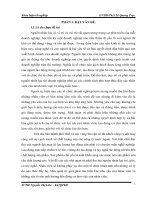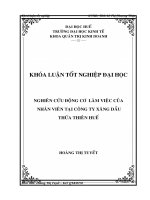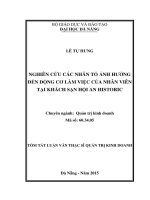PHÂN TÍCH ĐỘNG cơ làm VIỆC của NHÂN VIÊN tại MARITIME BANK e
Bạn đang xem bản rút gọn của tài liệu. Xem và tải ngay bản đầy đủ của tài liệu tại đây (111.99 KB, 9 trang )
PHÂN TÍCH ĐỘNG CƠ LÀM VIỆC CỦA NHÂN VIÊN TẠI
MARITIME BANK CONTENT:
INTRODUCTION
Motivation is very important factor for the development of a company
because it is fundamental for the maintenance and improvement of labor
productivity for the workforce. Recognizing this, the world researchers surveyed
and built several motivation theories to help managers make business measures to
increase the motivation for its labor team. Two of these theories are the Two Factor
theory of Herzberg and Needs Theory of Maslow, which are considered as the
important basic theories.
I. TWO FACTOR THEORY OF HERZBERG:
1. Introduction about theory:
Two-factor theory was researched and developed by a American psychologist
named Herzberg through interviews and surveys of 203 accountants and engineers
in the U.S. When establishing the theory, it generated a lot of surprises and changes
in the perception of the previous point. The view is that the opposite of
dissatisfaction is no dissatisfaction, as opposed to satisfaction is not satisfied.
2. Content of the theory:
The theory is built on two factors that are maintenance factors and
motivation factors.
Maintenance factor is the agent of the dissatisfaction of the employees in an
organization, which may be due to factors:
-
Policies and management practices of the business
-
Work supervision
-
Relationship with superiors
-
Working conditions
-
Salary
-
Relations with colleagues
-
The working atmosphere
-
Personal life
1
IeMBA B02_Trịnh Xuân Thắng
Management of Organizational Behaviour
Motivation is the factor of satisfaction and employee satisfaction at work
may be due to factors:
-
To achieve the desired results
-
The recognition of the organization
-
Responsibilities
-
The progress and career promotion
-
Desired growth
3. Nature analysis of theory:
Two-factor theory of Herzberg psychologists showed that for employees to
be motivated to work it must satisfy two conditions, which are maintenance factors
and motivation factors. While these maintenance factors are factors that if not dealt
with will create dissatisfaction for employees, (e.g. the company's policy is not
appropriate or too strict with workers ... and it will lead to dissatisfaction, unhappy
staffs of that organization). The, this reduces the incentive to work, but whether
there settlement of this factor is not only for employees with job dissatisfaction but
only unlikely to satisfy. Therefore, to make satisfaction for employees, it should be
dealt with maintenance factors that motivate people comfortably created by factors
such as achieving the desired results; the leaders recognize the achievement, career
promotion… Since then create joy and encouragement for employees to work
harder and harder, but if not dealt with these factors, it will cause dissatisfaction, but
not necessarily create dissatisfaction of the members. Therefore, the nature of the
theory is to provide real satisfaction for workers, not only care factor of employee
dissatisfaction, in which maintenance factors need to be carried out beforehand and
do not create dissatisfaction, and then motivation factors help employees to create a
powerful force for hard working and long dedication to the company.
II. NEEDS THEORY OF MASLOW:
1.
Introduction about theory:
Needs Theory of Maslow was developed and launched by a psychologist named Abraham
Maslow in 1943. It is one of the most popular theories of motivation and had great
influence. It is widely accepted and used in various different areas . Especially, it is applied
as one of the most important theories in business administration, particularly in the
2
IeMBA B02_Trịnh Xuân Thắng
Management of Organizational Behaviour
application of human resource management and marketing management . The theory
mentioned factors influence human motivation through human needs in the different levels
and from lower to higher in the pyramid.
2. Content of theory
Psychologist Maslow divided human needs in an orderly system has five
levels including low to high levels in pyramid. In particular, if the need for higher
levels want to occur, then the needs at lower levels must be satisfied, it means that
the basic needs at the bottom of the pyramid must be satisfied prior to the higher
needs. The higher need will arise and look forward to more intensely satisfying
when all basic needs at the bottom of the pyramid have been fully met.
The structure of Maslow's needs pyramid includes five levels in which
human needs are listed in an orderly manner hierarchical pyramid:
-
First layer: Basic needs (food, water, shelter, rest…)
-
Second layer: Safety needs (need to feel secured of physical
safety, employment, family, health, property secured …)
-
Third layer: Love needs (want to be a member of any
community groups that want to have calm family, friends, friendship and
trust …)
-
Forth layer: Esteem needs (need to feel respected, loved and
believed )
3
IeMBA B02_Trịnh Xuân Thắng
Management of Organizational Behaviour
-
Fifth layer: Self-actualization needs (want to be creative, be
able to show, express themselves, have recognized the achievements and
results)
3. Nature analysis of theory:
Needs theory of Maslow pointed out the need of any one man, divided into
two main groups that are the basic needs and higher needs.
Basic needs related to physical factors such as the human desire to have
enough food, water, rest… These needs are basic needs that are indispensable for
the daily needs and if not met fully, people will not survive so people will struggle
to get this need to exist in everyday life. The basic needs should take precedence
over the higher need because the basic needs must be satisfied and then people will
think of the higher needs. Therefore, Maslow said that needs at a higher level would
not occur unless basic needs were satisfied and the basic needs would dominate,
urge a pounding action when they had not been achieved yet.
Higher needs, including needs higher than basic needs are called higherorder needs. These needs include many mental factors such as demand for fair, safe,
fun, social status, respect and recognition… The higher need appears and is very
important because in addition to human survival through basic needs, they will need
to work, must dedicate; they need attention and appreciate the ability to get the
expected results. Therefore, Maslow had great attention to higher needs because
they are important factors to decide spirit, motivation and loyalty of the employees
of that organization, once these needs are not fulfilled, then they would leave the
organization whether they are in any position. The highest need that Maslow
mentioned is self-actualization needs and there is a need to be able to use all
potential of workers to assert them. To work and achieve success in society, that is
to seek ways in which power, wisdom, the ability of people are promoted and
workers feel good about them. However, in reality the need for self-actualization
gets relatively small proportion (only about 1%) since the personal selfactualization also depends on the training and awareness of employees.
4. Relationship between Needs Theory of Maslow and Two Factor
4
IeMBA B02_Trịnh Xuân Thắng
Management of Organizational Behaviour
Theory of Herzberg:
Although Needs Theory of Maslow and Two-Factor Theory of Herzberg
were built on the different elements, they have very tight relationships. While the
theory of Maslow orients motivation based on needs from basic to higher needs, the
theory of two factors on the human factor took care of motivation and development
factors. However if we look in nature, the contents of the two theories are similar
and complement each other in promoting the clarification of motivation, namely:
- Basic needs of people in Maslow’s Theory (to eat, drink, travel, rest, ...)
will be concretized by the agent causing dissatisfaction in the theory of two factors
such as salary, life private, working conditions ... because if they are paid high
wages, good company policies (welfare regimes ...) will be the main factor to satisfy
the basic needs of human.
- Needs for human safety (feeling assured of safe body, work, family, health
and property are guaranteed ...) will always be met if the company has good policies
(security insurance, maternity ...), good working conditions, working atmosphere,
private lives of families and individuals which are not compromised.
- Social needs (as a member of any community groups that want to have
calm family, friends, friendship and trust ...) are satisfied if factors such as
relationships with colleagues, relationships with the leadership, the air supposed to
work well... will create trust and mutual interest.
- Valued needs will be satisfied if the factors are assigned and acknowledged
in the organization...
- Self-actualization needs (to be creative, be able to show, express
themselves, have recognized the achievements and the fruits thereof) will be
satisfied if such factors are recognized and assigned responsibilities to individuals
that achieve desired results and career advancement…
Overall, Maslow's needs theory has mixed and blended with elements of the
Herzberg two-factor theory, in which the needs factors of Maslow's theory include
5
IeMBA B02_Trịnh Xuân Thắng
Management of Organizational Behaviour
many two-factor theory factors and vice versa, but in nature they are to motivate
people.
III. ANALYZE MOTIVATION FOR EMPLOYEES AT MARITIME
BANK:
1. General introduction about Maritime bank:
Vietnam Maritime Joint Stock Commercial Bank (Maritime Bank) is a
leading commercial bank in Vietnam (top 12). It was established in 1991 with the
founding shareholders of the corporation or State Corporation such as Vietnam
Maritime Bureau, Vietnam Posts and Telecommunications Group, Vietnam Civil
Aviation Administration... After 20 years of growth, the Bank has evolved and
grown to nearly 300 transaction points in the provinces and cities, along with the
overall decision to change from business-oriented, brand image, transaction space
design to approach customers… Currently, the Maritime Bank is identified as an
excellent bank, which has the new direction, professional operation model and most
modernization in Vietnam
- ADDRESS: 88 Lang Ha – Dong Da District - Hanoi
- Tel: 043.7718989 - Fax: 043.7718899
- Email:
- Website: www.msb.com.vn
1. Motivation of employees at Maritime bank:
With the development of bank strategy towards modernization, the bank
retrieves the value of high-quality workforce as the core to build brand growing.
Promoting awareness of motivating employees is very important so the bank has
always led Maritime and facilitates care for the lives of officers and employees,
specifically the work motivation of employees is shown as follows:
-
The existence needs and physiological needs: The pay policies
are fair and competitive based on the basic wage (salary) and the capacity of
each individual. In addition, salaries rank quite highly in the banking system
in Vietnam (average of about 6-7 million / month) which has created
conditions for workers to cover costs for lives of them and their families.
6
IeMBA B02_Trịnh Xuân Thắng
Management of Organizational Behaviour
Apart from salary, the employee shall be paid allowances as lunch allowance,
dearness allowances. Working time at the Maritime Bank is 8 hours per day,
so staffs have time for lunch and rest for recuperation after tiring workdays,
along with the mode of travelling 2 times per years, which make people feel
relaxed and are exploring the new land. This is what Maritime bank has
satisfied the factors to make maintenance of Herzberg (Wages, working
conditions, policies and management practices ...). Needs for safety or
protection needs: A policy of care and health protection of employees at
Maritime is social insurance, health insurance and insurance monthly
unemployment. Thus, the interests of the workforce are ensured and they are
safe for the long-term in the bank. In addition, staffs’ health is checked every
6 months / time and then they are always confident because health is
guaranteed to secure long-term work for the company. This is an element to
satisfy the maintenance of two-factor theory of Herzberg (on company
policy, working conditions ...)
-
Social needs: At Maritime bank, banking culture is proposed to
create an environment of equality, friendly with customers and colleagues.
The bank's management is that each person will be allocated and assigned
responsibilities and functions of their competence. However, all the jobs are
related and formed into a closed process, so the job is teamwork approach
that is always appreciated and all work under the general Maritime house. At
work, staff members participate in meetings and workshops between the
team and departments weekly or monthly to identify measures to overcome
difficulties and remove, thereby developing a sense of the group of
individuals in the bank. In addition, Maritime Bank also encourages
individuals to write articles for its own magazines "Why not" or join the
Maritime bank or social network "Maritime bank Face book " to write about
the experience sharing or just to share confided to colleagues, advertising
about the bank to friends and relatives. This has partly contributed to binding
the solidarity in the Maritime community bank, along with group activities
such as fundraising activities and charity donations and supporting poor
7
IeMBA B02_Trịnh Xuân Thắng
Management of Organizational Behaviour
people or allowing members to visit the resort. These activities have also
contributed to the staffs and workers promoting the community spirit of the
Maritime Bank. This is also expressed satisfaction at the factors that
employees maintain (personal life, relationships with colleagues and
leaders ...) of the two factors theory of Herzberg.
-
Esteem needs: Staffs of the Maritime bank work in the
spacious office with modern equipment. Team of receptionists and graceful
secretaries are elegant things, which are very simple but give the impression
and importance in the success of the labor force because it has made a good
impression and reputation with the bank's customers. Monthly, Maritime
bank launched the competition for professional ethics (business excellence
team, managing director, good customer, and product center ...) along with
the public and awards for individual and collectives for their good
achievements with valuable prizes as well as promotion in work position.
They are to encourage and promote morale of officers and employees or also
the satisfaction of motivation factors (recognition of organizations to achieve
the desired results, advancement in career of ...) of two-factor theory of
Herzberg.
Self-actualization needs: Maritime bank always creates good conditions so
that each staff member has the ability to develop themselves through the allocation
of responsibility and autonomy for individuals at work and evaluate performance
through the practical performance. However, the self-development at the bank
cannot promote efficiency by understanding and evaluating the ability of each
individual as well as enabling them to self-thinking, create (as find alternatives for
new business production, the new way of customer service, creativity ...). Maybe
the framework of the rules and regulations of the banks, which set out the
responsibilities of each employee, will constrain these things and they must comply
with that. The creation of employees just stops at the work such as creating a new
ad image or innovating the team of project program.
CONCLUSION
8
IeMBA B02_Trịnh Xuân Thắng
Management of Organizational Behaviour
In the course of corporate executives, managers and executive leaders should
motivate their staffs by performing the acts or use a specific tool (by physical or
mental ways). This is to promote the ability to bring all its staffs work with the best
effort to achieve the proposed objectives of the company. This is very normal
problem but is not simply because man is a sophisticated and complex entity.
However, access to the impetus theory of psychologists (i.e. Two-Factor theory of
Herzberg and Maslow's Needs Theory) is a very important facility to help business
leaders identify and choose to apply the most effective methods of motivating
workers.
9
IeMBA B02_Trịnh Xuân Thắng









